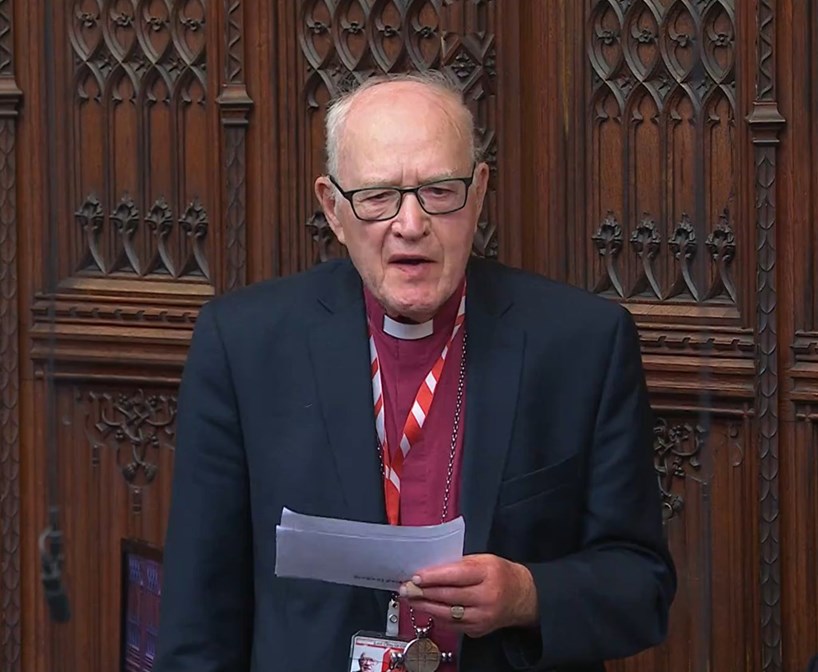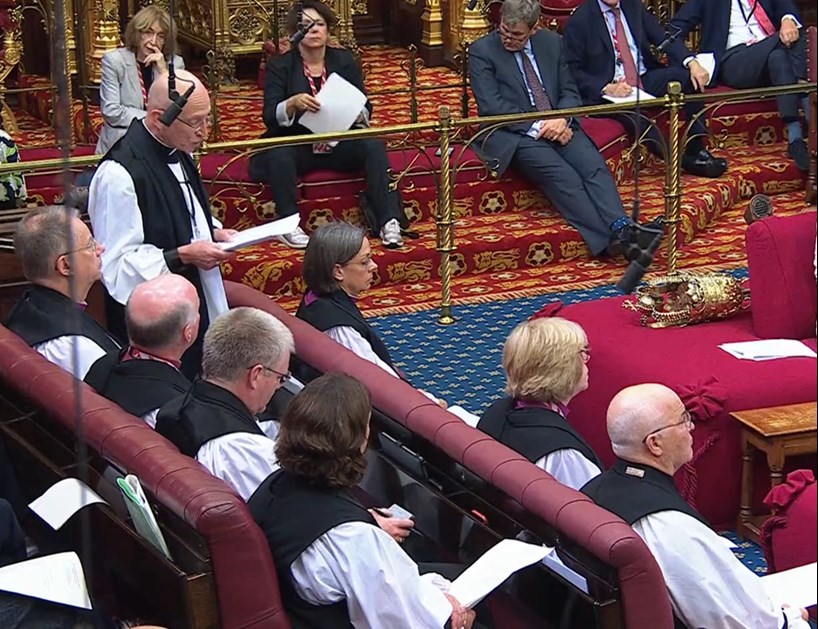A FORMER and current Archbishop presented opposing views on assisted dying on Friday, on the second of two days of debate on the Terminally Ill Adults (End of Life) Bill in the House of Lords.
“We belong with and for each other. This Bill is wrong because it ruptures relationships, serving one need but creating many others,” the Archbishop of York told peers, warning that passing the Bill would “unleash into our society a fundamental change in our relationships: the relationship between death and life, doctor and patient, parent and child, citizen and state”.
But a former Archbishop of Canterbury, Lord Carey, said that the Church risked harming its legitimacy by standing in the way of the Bill, which has already passed, albeit narrowly, in the House of Commons (News, 20 June).
It has been agreed that the Bill will now be scrutinised by a select committee, in a step welcomed by Archbishop Cottrell. But he said that, if it returned for a Third Reading, the bishops would be willing to table an amendment to force a vote on the issue.
Speaking at the end of the debate, he expressed sympathy with the desire not to see loved ones suffer a prolonged, painful death, but said: “There is a moral universe of difference between doctors and clinicians, in consultation with families, withdrawing treatment in the last days of someone’s life, to picking out six months as the point at which life for some can be extinguished.”
Archbishop Cottrell dismissed as wishful thinking assurances that the scope of eligibility for the an assisted death, currently set as a life expectancy of six months or less, wouldn’t in time be expanded.
He also asked — rhetorically — whether anyone seriously thought that the passage of the Bill would not have a detrimental impact on palliative care.
He recalled the year he spent working in a hospice, before he began training for ordination. It was, he said, probably the most formative year of his life, during which he learned that it was possible, in most cases, to control terminal conditions in order to honour people’s dignity, “upholding their value as someone made in the image of God until their life’s end”.
 ParliamentTVThe former Archbishop of Canterbury Lord Carey speaks in the debate
ParliamentTVThe former Archbishop of Canterbury Lord Carey speaks in the debate
The House of Commons rejected an amendment which would have permitted hospices which did not want to provide assisted dying. On Friday, Archbishop Cottrell joined the RC Archbishop of Liverpool, the Most Revd John Sherrington, in criticising the move. In June, Archbishop Sherrington said that “many Catholic institutions could be under threat” as a result of the legislation (News, 20 June).
As during last week’s debate, the benches reserves for the Lords Spiritual were full, and Archbishop Cottrell alluded to the strength of the bishops’ opposition. “If this Bill does reach a Third Reading, we on these benches would be prepared to table an amendment to offer us a vote,” he said.
Earlier in the debate, the Bishop of Chichester, Dr Martin Warner, said that the concept of the right to life “should not be regarded as the imposition of Christianity on the pluralistic society we are proud to be”.
He suggested that a change to the law would affect “people who already doubt whether they are valued and understood”, and that it would take from them “the law’s protection from their right to life.
“It’s a fundamental assault upon their dignity,” he said.
Lord Carey is one of the few prominent figures in the Church of England to speak in support of a change to the law. On Friday, he described how his views on assisted dying had changed over time. After voting against a Private Member’s Bill brought by Lord Joffe in 2005 he had looked deeper into the subject, and discovered that the “Christian faith had very little to say directly about this modern issue”, he said.
“This shocked me very deeply, and I then explored more the experience of people going through shocking experiences of pain and indignity,” he continued.
It was “right” that sitting bishops in the House of Lords had spoken “so powerfully and well” in the debate, but he suggested that they were “not representing their own Church in this matter”.
In 2023, a poll by the campaign group Dignity in Dying suggested that a majority of Anglicans support assisted dying. At the time, Lord Carey and Rabbi Jonathan Romain said that the poll called into question the robustness of the opposition mounted by Church of England bishops (Comment, 13 October 2023).
Other polls have concluded that the view is in the minority among churchgoers. In July, the General Synod condemned the legislation currently under consideration by a vote of 238-7, and called for greater funding for palliative care (News, 18 July).
On Friday, Lord Carey said that he was not “haranguing” the Lords Spiritual, but he reminded them of the Jesus Prayer — “Lord, have mercy” — and urged them to be mindful of “compassion, mercy, the act of kindness with the art of healing”.
He asked the bishops: “Do we really want to stand in the way of this Bill?” Regardless of opposition it would pass the House of Lords and become law, he said, and urged the Church: “Do not risk our legitimacy by claiming that we know better than the public.”
THE former faith advisor to the Labour Party, and an Anglican priest, Lord Rook, said that he was concerned that the increasing costs of end-of-life care might drive vulnerable people towards an assisted death.
He said that states in the US where assisted dying had been legalised had seen a rise in the percentage of people choosing an assisted death due, at least in part, to concerns about their finances and being a burden on their families.
Lord Rook called for further scrutiny of the Bill, supporting the proposal of a select committee and pledging to work on the Bill “for as long as it takes, to ensure that we can give a good end to all”.
 ParliamentTVThe Bishop of Chichester, Dr Martin Warner, speaks in the debate
ParliamentTVThe Bishop of Chichester, Dr Martin Warner, speaks in the debate
On Thursday, it was announced that the Bill would be subject to a select committee process, effectively fulfilling the demand of an amendment that had been tabled by Baroness Berger. The Bishop of Newcastle, Dr Helen-Ann Hartley, was one of a number of members who spoke in support of her proposal last week.
Friday’s debate was opened by Baroness Thornton, speaking in support of legal change, and urging peers not to reverse the decision taken in the House of Commons. “It is not our job to kill this Bill,” she said.
She criticised the former Prime Minister, Baroness May, for referring to assisted dying as suicide; and, later in the debate, Baroness Blackstone said that her experience of her husband’s death from stomach cancer meant that she was “affronted” by such language.
“Be truly compassionate in sparing terrible suffering as death approaches, allowing those who choose to die sooner to do so,” Baroness Blackstone said, and called on those who object to the Bill not to “impose their views”.
Baroness Thornton quoted an authorised lay preacher in the Church of England, Pamela Fisher, who had said that she was “not asking anyone to help me shorten my life” but instead “seeking to have the choice to shorten my death if in my final weeks my pain and suffering prove unbearable”.
Ms Fisher, who has terminal breast cancer, had said that she “cannot reconcile Christian compassion with the status quo that obliges people to suffer a drawn-out process of dying in pain when it is against their will and they have the capacity to choose”.
Church leaders had engaged in “energetic lobbying” against the Bill, Ms Fisher had said, and invoked the principle of sanctity of life in order to do so, but she “rejected the assumption that the sanctity of life requires terminally ill people to undergo a painful and distressing death against their will”.
When the Bill passed in the House of Commons in June, Ms Fisher was among the campaigners gathered on Parliament Square. Speaking minutes after the result, she said: “My God is a God of love, a God of compassion, and I think he wants us to work together with him to create a more compassionate and inclusive world” (News, 27 June).














